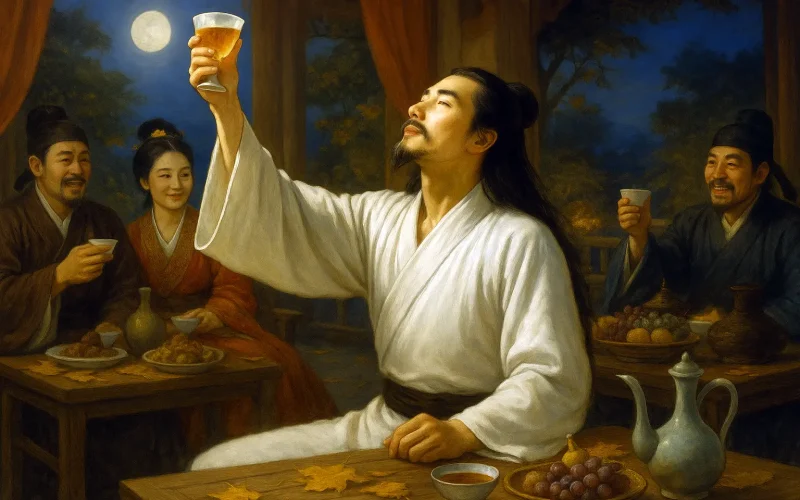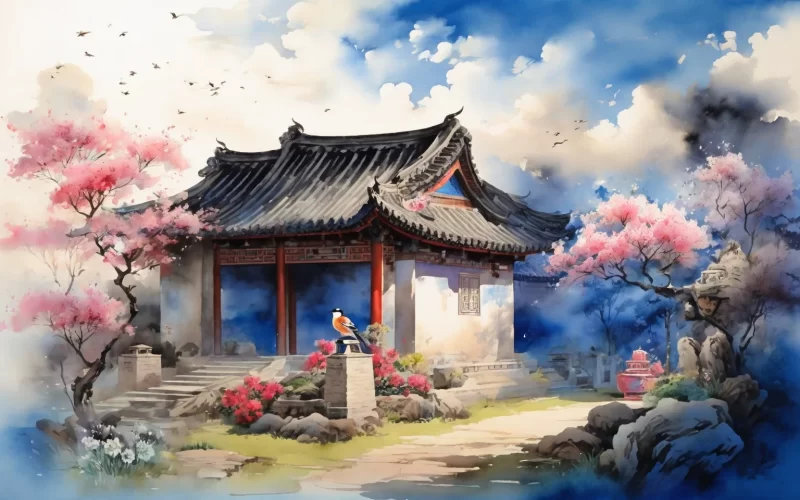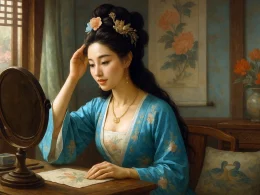The delicious wine of Lanling is of golden hue,
It is filled with fragrance and with flavor fine.
If you can make me drunk, my host dear,
I’ll not know where is a land of my own.
Original Poem
「客中行」
李白
兰陵美酒郁金香,玉碗盛来琥珀光。
但使主人能醉客,不知何处是他乡。
Interpretation
Composed during Li Bai's travels in Eastern Lu (around 744-745 CE) after his dismissal from court, this work reflects a pivotal transformation. The collapse of his political ambitions did not lead to despair but catalyzed his pursuit of an alternative form of fulfillment—spiritual freedom and worldly joy. At Lanling, he transmuted disappointment into poetry, dissolving the rootlessness of travel in fine wine and expansive sentiment, creating this masterpiece that appears to celebrate pleasure while concealing profound existential tension.
First Couplet: "兰陵美酒郁金香,玉碗盛来琥珀光。"
Lánlíng měijiǔ yùjīnxiāng, yù wǎn chéng lái hǔpò guāng.
Lanling's fine wine breathes tulip's fragrance; Jade bowls hold its amber-glow radiance.
The couplet opens with sensory richness, engaging smell and vision. "Tulip's fragrance" cleverly plays on the spice curcuma used in brewing while evoking floral elegance. "Jade bowls" and "amber-glow" merge texture and color—the nephrite's warmth and nobility complementing the wine's translucent beauty. This transcends mere description, embodying the poet's idealized aesthetic of existence, setting the highest standard for sensory pleasure in this traveler's feast.
Second Couplet: "但使主人能醉客,不知何处是他乡。"
Dàn shǐ zhǔrén néng zuì kè, bù zhī hé chù shì tā xiāng.
If my host can share this drunken delight, I'll forget where lies my native land.
Here lies the poem's emotional climax and philosophical core. The conditional "if" transforms the preceding material beauty into a vehicle for genuine connection and shared joy. Emotional bonds transcend geographical belonging. "Forget" and "where lies my native land" represent not amnesia but conscious choice—a spiritual transcendence where wine becomes the medium for metamorphosis from geographical wanderer to spiritual freeman. This is both a bold declaration and profound insight into life's journey.
Holistic Appreciation
The poem's power lies in its purity and structural precision. The first couplet builds sensory richness through material beauty; the second achieves spiritual elevation through emotional connection. This clean four-line structure carries an unbroken emotional flow. Defying conventional travel poetry's melancholy, it generates intensified vitality within the "traveler" context. Li Bai's "drunkenness" is not escapist numbness but active embrace of the present—using subjective spirit to dissolve objective constraints. He elevates a simple traveler's feast into a philosophical manifesto: peace of mind need not be bound by geography.
Artistic Merits
- Exquisite Sensory Layering: "Tulip's fragrance" (olfactory), "jade bowls" (tactile/visual), and "amber-glow" (visual) create multi-sensory richness, grounding the poem's emotional expression in tangible experience.
- Sudden Emotional Sublimation: The shift from material appreciation to human connection and philosophical insight in the third line creates powerful spiritual impact.
- Measured Abandonment: The poem's expansive emotion is refined by elegant imagery like "jade" and "amber," blending unrestrained feeling with classical restraint, showcasing Li Bai's masterful linguistic control.
- Affirmative Power of Negation: The negative formulation "forget where lies my native land" proves more powerful than direct statements like "content to stay," demonstrating resolute transcendence through active forgetting.
Insights
This poem reveals advanced wisdom for maintaining agency amid adversity. Li Bai shows that belonging stems not merely from external environment but from how we consciously perceive and engage with the world. When reality withholds native comfort, we can create spiritual homes through genuine connection ("host's shared delight") and immersion in beauty (fine wine). This capacity to generate belonging amid displacement and craft poetry from disappointment offers timeless inspiration for navigating change and challenge.
About the poet

Li Bai (李白), 701 - 762 A.D., whose ancestral home was in Gansu, was preceded by Li Guang, a general of the Han Dynasty. Tang poetry is one of the brightest constellations in the history of Chinese literature, and one of the brightest stars is Li Bai.












